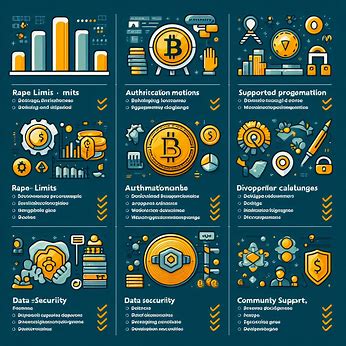You’re a crypto enthusiast and ready to take your trading level to the next level. Here, cryptocurrency exchanges have the best decentralized finance (DeFi) integration.
1. Binance
Binance is known as the world’s largest cryptocurrency exchange by trading volume, and it has made significant strides in the DeFi space. With the introduction of Binance Smart Chain (BSC), a blockchain platform compatible with Ethereum, Binance has created a developing ecosystem for DeFi projects.
One of the standout features of Binance’s DeFi integration is the Binance Launchpad, a platform that hosts initial exchange offerings (IEOs) for promising DeFi tokens. This provides users with early access to high-potential projects and the ability to invest in them directly through their Binance accounts.
2. Huobi Global
Huobi Global is another prominent cryptocurrency exchange that has encircled DeFi integration. Through its Huobi Eco Chain (HECO), a blockchain platform similar to Binance Smart Chain, Huobi has allowed a better DeFi ecosystem.
Huobi’s DeFi offerings include Huobi Earn, a platform that allows users to participate in liquidity mining and earn rewards by providing liquidity to various DeFi protocols. With a wide range of supported assets and competitive yields, Huobi Earn has become a popular choice among DeFi enthusiasts.
Moreover, Huobi has launched its own decentralized exchange (DEX) called Huobi DEX. Built on the HECO blockchain, Huobi DEX enables users to trade cryptocurrencies in a trustless and decentralized manner, aligning with the core principles of DeFi.
3. OKEx
OKEx has created a better infrastructure for DeFi development and integration.
One of the key features of OKEx’s DeFi ecosystem is the OKEx DEX, a decentralized exchange that allows users to trade cryptocurrencies directly from their wallets. The OKEx DEX offers an easy trading experience and supports a wide range of DeFi tokens.
Additionally, OKEx provides a DeFi platform called OKEx Earn, where users can participate in various DeFi protocols and earn rewards. From staking and yield farming to liquidity mining, OKEx Earn offers a suite of DeFi investment opportunities.
4. KuCoin
KuCoin, a globally renowned cryptocurrency exchange, has actively grasped the DeFi revolution. With its KuCoin Community Chain (KCC), a blockchain platform compatible with Ethereum, KuCoin has created a conducive environment for DeFi projects to flourish.
KuCoin offers a dedicated DeFi section called KuCoin Earn, where users can find various DeFi investment opportunities. From staking and lending to liquidity mining and yield farming, KuCoin Earn provides a user-friendly interface for users to participate in DeFi protocols and earn attractive returns.
5. Coinbase
Coinbase, one of the most popular cryptocurrency exchanges, has made significant strides in integrating DeFi features into its platform. With a user-friendly interface and a strong focus on accessibility, Coinbase aims to bring DeFi to the masses.
Coinbase’s DeFi offerings include Coinbase Earn, a platform that allows users to earn cryptocurrencies by learning about various DeFi projects. Through educational content and quizzes, users can acquire knowledge about DeFi while earning rewards in the process.
Related: Best Blockchain Platforms for Decentralized Autonomous Organizations (DAOs)
6. Kraken
Kraken, a veteran cryptocurrency exchange known for its security and reliability, has also grasped DeFi integration. With a focus on empowering traders, Kraken offers a range of DeFi-related features and services.
Kraken’s DeFi offerings include staking services, where users can stake their cryptocurrency holdings and earn rewards for supporting the network. Kraken supports a wide range of popular DeFi tokens, allowing users to diversify their staking portfolio.
7. BitFinex
BitFinex, known as a long-standing cryptocurrency exchange, has been at the forefront of DeFi innovation. With its close ties to the Ethereum ecosystem, BitFinex has absolutely played a significant role in the growth and development of DeFi.
BitFinex offers a dedicated DeFi platform called BitFinex Borrow, which allows users to lend and borrow cryptocurrencies in a decentralized manner. With competitive interest rates and various kinds of supported assets.
8. Gemini
Gemini is a regulated cryptocurrency exchange founded by the Winklevoss twins. With a strong emphasis on compliance and security, Gemini aims to make DeFi accessible to a broader audience.
Gemini’s DeFi offerings include Gemini Earn, a platform that allows users to earn interest on their cryptocurrency holdings. By partnering with leading DeFi protocols like Compound and dYdX, Gemini Earn provides users with a simple and secure way to generate passive income.
Moreover, Gemini has launched its own stablecoin called Gemini Dollar (GUSD), which is pegged to the US dollar. GUSD can be used across various DeFi protocols, enabling users to participate in DeFi lending, borrowing, and trading with the stability of a fiat-backed stablecoin.
9. Bybit
Bybit, a cryptocurrency derivatives exchange, has recognized the potential of DeFi integration. By leveraging DeFi protocols, Bybit aims to enhance the trading experience for its users.
Bybit has integrated DeFi protocols into its platform, allowing users to access decentralized lending and borrowing services directly from their Bybit accounts. This integration enables traders to manage their positions more efficiently and capitalize on DeFi opportunities.
10. Gate.io
Gate.io, a cryptocurrency exchange, has been actively supporting the growth of the DeFi ecosystem. With a wide range of DeFi-related services and features, Gate.io aims to empower users to participate in the DeFi revolution.
Gate.io offers a dedicated DeFi section called Gate.io Earn, where users can find various DeFi investment opportunities. From staking and yield farming to liquidity mining and lending, Gate.io Earn provides a user-friendly interface for users to engage with DeFi protocols.
Key Takeaways
1. Decentralized finance (DeFi) has emerged as a game-changer in the cryptocurrency space, offering a wide range of financial services without relying on traditional intermediaries.
2. Leading cryptocurrency exchanges, such as Binance, Huobi, OKEx, and Coinbase, have successfully integrated DeFi features into their platforms, providing users with seamless access to DeFi protocols.
3. Exchanges offer various DeFi services, including staking, yield farming, liquidity mining, lending, and borrowing, allowing users to earn attractive returns on their cryptocurrency holdings.
4. Many exchanges have developed their own blockchain platforms, such as Binance Smart Chain and Huobi Eco Chain, to foster the growth and development of DeFi projects.
5. Decentralized exchanges (DEXs) have gained prominence, with exchanges like Binance DEX, Huobi DEX, and KuCoin DEX enabling users to trade cryptocurrencies in a trustless and decentralized manner.
6. The integration of DeFi into cryptocurrency exchanges has opened up new opportunities for traders and investors, providing them with a gateway to the innovative world of decentralized finance.
7. As the DeFi ecosystem continues to evolve, we can expect to see even greater collaboration and integration between centralized exchanges and DeFi protocols.
8. While the potential rewards of DeFi can be significant, it is crucial for users to conduct thorough research, exercise caution, and make well-informed decisions when participating in DeFi activities.
9. The convergence of centralized and decentralized finance is expected to accelerate, with exchanges playing a crucial role in driving mainstream adoption of DeFi.
Frequently Asked Questions
1: What is decentralized finance (DeFi)?
Decentralized finance, or DeFi, refers to a system of financial applications and services built on blockchain technology. DeFi platforms offer various financial services, such as lending, borrowing, staking, and trading, without relying on traditional intermediaries like banks.
2. How do cryptocurrency exchanges integrate DeFi features?
Cryptocurrency exchanges integrate DeFi features by developing their own blockchain platforms, partnering with existing DeFi protocols, or offering dedicated DeFi services within their platforms. This integration allows users to access DeFi functionalities directly from their exchange accounts.
3. What are some popular DeFi services offered by cryptocurrency exchanges?
Some popular DeFi services offered by cryptocurrency exchanges include:
1. Staking: Users can stake their cryptocurrency holdings to earn rewards.
2. Yield Farming: Users can provide liquidity to DeFi protocols and earn rewards in return.
3. Lending and Borrowing: Users can lend their cryptocurrencies to others or borrow funds using their crypto assets as collateral.
4. Decentralized Trading: Users can trade cryptocurrencies in a trustless and decentralized manner through decentralized exchanges (DEXs).
4. What are the benefits of using DeFi services on cryptocurrency exchanges?
Using DeFi services on cryptocurrency exchanges offers several benefits, such as:
1. Convenience: Users can access DeFi functionalities directly from their exchange accounts, eliminating the need to navigate multiple platforms.
2. Liquidity: Exchanges often have high liquidity, making it easier to enter and exit DeFi positions.
3. User-Friendly Interface: Exchanges provide user-friendly interfaces, making it easier for users to interact with DeFi protocols.
4. Security: Reputable exchanges implement robust security measures to protect user funds and assets.
5. Are there any risks associated with DeFi on cryptocurrency exchanges?
Yes, there are risks associated with DeFi on cryptocurrency exchanges, including:
Smart Contract Risks: DeFi protocols rely on smart contracts, which may contain vulnerabilities or bugs that can lead to a loss of funds.








